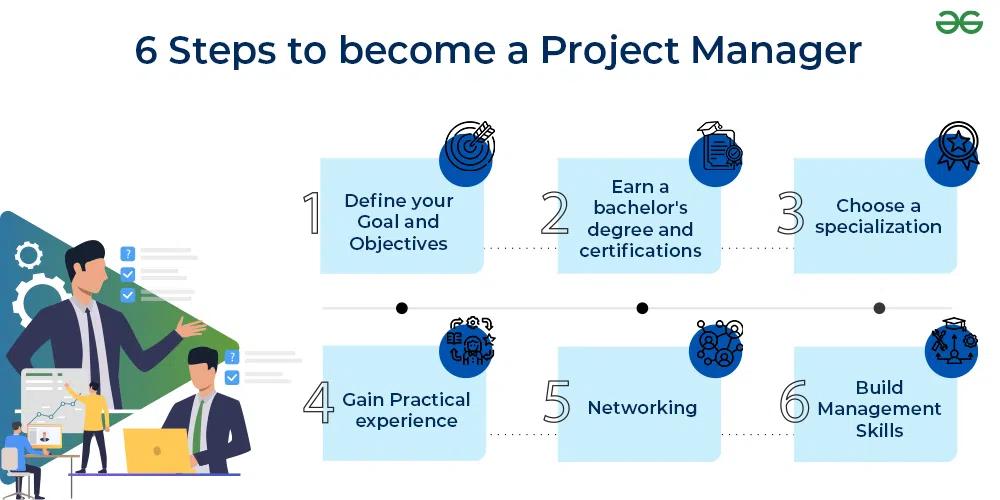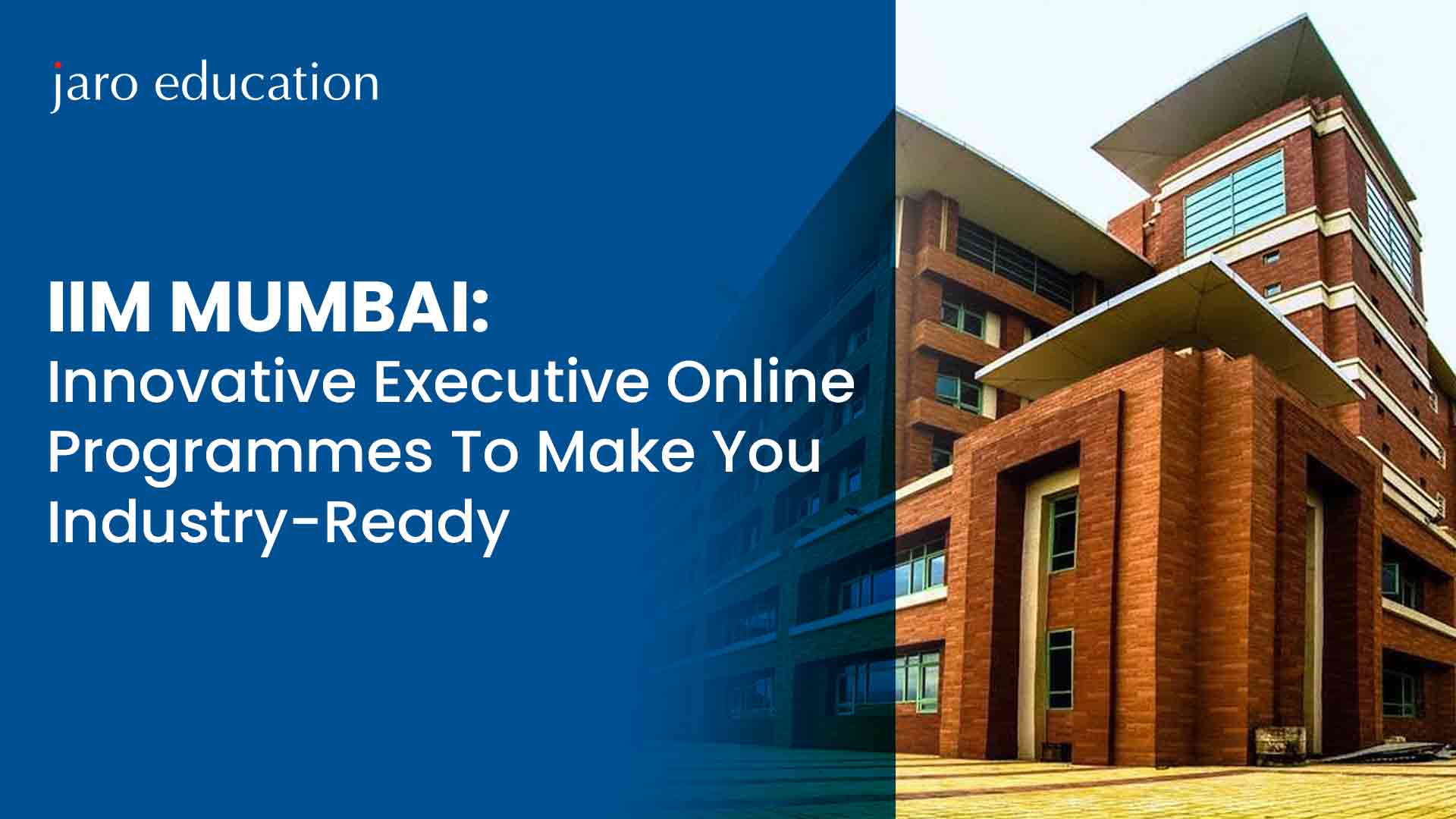How to Become a Project Manager: A Beginner’s Roadmap
Table of Contents

Project management is a dynamic and rewarding field that combines technical expertise, leadership, and communication skills to achieve business objectives. Whether you are just starting or looking to enhance your career, understanding how to become a project manager is crucial. This guide provides actionable tips to help you master the project management process and make your mark as a successful professional.

*GeeksforGeeks
1. Understand the Fundamentals of Project Management
To embark on your journey to understand how to become a project manager, you must first grasp the basics of the profession. The importance of project management lies in its ability to align resources, schedules, and budgets with organizational goals. Begin by familiarizing yourself with key concepts such as project life cycles, risk assessment, and stakeholder management.
A solid foundation often requires formal education. Enrolling in a project management certification online can provide you with theoretical knowledge and practical skills. These courses cover essential topics like planning, execution, monitoring, and closure. Certifications such as PMP (Project Management Professional) or PRINCE2 (Projects IN Controlled Environments) are widely recognized and can significantly boost your credibility.
Tip: Look for courses that offer real-world projects and case studies. This hands-on experience will prepare you for the complexities of managing actual projects.
2. Develop Key Skills for Project Management Success
-
- Leadership and Team Management: A project manager must inspire and guide their team toward a common goal. This involves assigning tasks, resolving conflicts, and ensuring effective collaboration.
- Communication: Clear and concise communication is essential to keep stakeholders informed and align team efforts.
- Time Management: Prioritize tasks and manage schedules effectively to meet deadlines.
- Problem-Solving: Anticipate challenges and devise practical solutions to keep the project on track.
- Technical Expertise: Familiarity with project management tools like Microsoft Project, Asana, or Jira can streamline the project management process.
3. Gain Practical Experience Through Real Projects
While theoretical knowledge is essential, nothing beats hands-on experience. Start by volunteering for smaller projects within your organization to build confidence and understand the nuances of project management before delving into how to become a project manager. As you gain experience, take on more complex assignments that challenge your abilities.
Consider shadowing an experienced project manager to learn from their approach. Observe how they handle various aspects of the project management process, from stakeholder communication to risk mitigation. This exposure will give you insights into practical strategies that can’t be taught in a classroom.
Tip: Document your experiences in a portfolio. Highlight your accomplishments, challenges, and lessons learned to showcase your growth as a project manager.
4. Stay Updated with Industry Trends and Tools
The field of project management is continually evolving, with new methodologies and tools emerging regularly. Staying updated is vital to remain competitive and effective. Agile, Scrum, and Kanban are popular methodologies that emphasize flexibility and efficiency. Familiarize yourself with these approaches to broaden your skill set.
Additionally, invest time in mastering project management software. Tools like Trello, Basecamp, and Monday.com simplify task allocation, progress tracking, and team communication. Understanding these tools enhances your productivity and ensures seamless execution of projects.
For those seeking formal credentials, completing a project management certification online focused on modern methodologies can be a game-changer. Such programs often include training in digital tools and emerging trends, preparing you for the future of project management.
5. Build a Strong Professional Network
Networking plays a crucial role in career advancement. Attend industry conferences, join professional associations like the Project Management Institute (PMI), and connect with peers on platforms like LinkedIn. Engaging with the project management community opens doors to mentorship opportunities, job referrals, and knowledge sharing.
Participating in online forums and discussion groups can also be beneficial. Share your experiences, ask questions, and seek advice from seasoned professionals. These interactions provide valuable insights and foster relationships that can support your career growth.
Tip: Use networking opportunities to find a mentor who can guide you in understanding the importance of project management and offer personalized advice.
The Importance of Certifications in Project Management
-
- PMP (Project Management Professional): Offered by PMI, this certification is globally recognized and covers a wide range of project management principles.
- CAPM (Certified Associate in Project Management): Ideal for beginners, this certification provides a foundational understanding of project management.
- Scrum Master Certification: Focused on Agile methodologies, this certification is perfect for those working in dynamic environments.
Overcoming Challenges in Project Management
-
- Scope Creep: Clearly define project objectives and document them in a scope statement. Regularly review and update this document with your team and stakeholders.
- Resource Constraints: Plan resource allocation meticulously. Use project management tools to track availability and optimize utilization.
- Communication Gaps: Establish regular check-ins and use collaborative platforms to keep everyone aligned.
Career Path and Growth Opportunities
Project management offers diverse career paths across industries such as IT, construction, healthcare, and finance. As you gain experience, you can advance to senior roles like Program Manager, Portfolio Manager, or Chief Project Officer.
Investing in continuous learning is crucial for growth when understanding how to become a project manager. Enroll in advanced certifications or pursue an MBA in Project Management to deepen your expertise. Specialized courses on emerging topics like AI integration in the project management process can also set you apart.
Tip: Always stay curious and open to learning. The more you adapt and evolve, the more successful you’ll be.
If you’re aiming to take your project management skills to the next level and truly grasp how to become a project manager, consider enrolling in the IIM Mumbai- Executive Certificate Programme in Advanced Project Management and Analytics. This programme is designed for professionals looking to enhance their expertise in managing complex projects with advanced tools and analytics. With its industry-aligned curriculum, interactive online classes, and focus on real-world applications, this certification equips you with the knowledge and confidence to excel in your career.
Conclusion: How to Become a Project Manager
Becoming a successful project manager requires a combination of education, skill development, and practical experience. By understanding how to become a project manager, you can take the first steps toward a fulfilling career. Focus on mastering the project management process, earning a project management certification online, and building strong networks to achieve your goals.
Remember, the importance of project management lies in its ability to drive organizational success. As you grow in this field, your contributions will have a lasting impact on the projects and people you lead. Start your journey today and unlock the potential to excel in this dynamic profession.
Frequently Asked Questions
If you’re wondering how to become a project manager, the qualifications you need can vary depending on the industry. However, most project managers typically require a strong background in management, leadership, and industry-specific knowledge. Many aspiring project managers start by obtaining a relevant degree, such as in business administration, engineering, or information technology. In addition to a degree, obtaining certifications like the PMP (Project Management Professional) or CAPM (Certified Associate in Project Management) can significantly enhance your chances. Understanding how to become a project manager also means being equipped with key skills like communication, problem-solving, and time management.
When considering how to become a project manager, starting your career requires a few strategic steps. Begin by acquiring foundational knowledge in management and leadership, either through a degree program or self-study. Many individuals start in entry-level positions, such as project coordinator or assistant project manager, where they can gain hands-on experience. Alongside this, it’s important to pursue certifications in project management, as they can boost your qualifications. You might also want to join professional networks and participate in relevant training programs. With experience, you’ll learn how to become a project manager by overseeing projects from conception to completion.
When you’re asking how to become a project manager, it’s essential to understand the core responsibilities that dominate the role. 90% of a project manager’s job involves communication and coordination. This includes managing teams, liaising with stakeholders, ensuring timelines and budgets are adhered to, and solving problems that may arise during the project lifecycle. As you delve into how to become a project manager, you’ll realise that it’s not just about technical knowledge but also about leading and motivating teams, maintaining clarity in communication, and ensuring successful project delivery.
A degree is an important factor in how to become a project manager, but it’s not the only requirement. While degrees in business administration, management, or engineering are common, project management skills can be honed through various educational paths. Many people pursue degrees in areas relevant to the specific industry in which they want to manage projects. Whether it’s a Bachelor of Business Administration (BBA), a Master’s in Project Management, or a technical degree, having a strong academic foundation can be crucial in understanding how to become a project manager. Additionally, pursuing certifications and real-world experience will further help in reaching this career goal.














